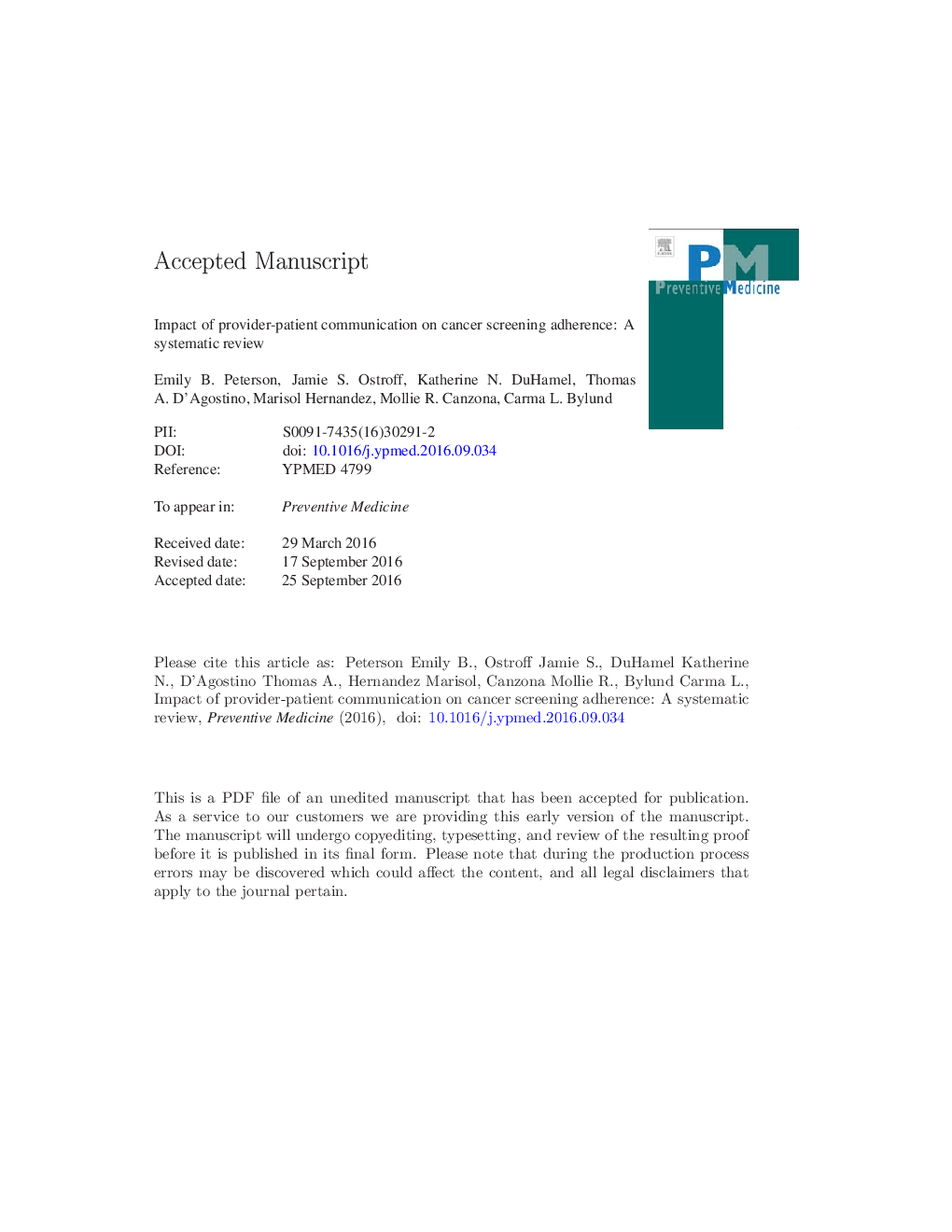| کد مقاله | کد نشریه | سال انتشار | مقاله انگلیسی | نسخه تمام متن |
|---|---|---|---|---|
| 8693816 | 1581621 | 2016 | 35 صفحه PDF | دانلود رایگان |
عنوان انگلیسی مقاله ISI
Impact of provider-patient communication on cancer screening adherence: A systematic review
ترجمه فارسی عنوان
تأثیر ارتباطات ارائه دهنده و بیمار در پذیرش غربالگری سرطان: بررسی سیستماتیک
دانلود مقاله + سفارش ترجمه
دانلود مقاله ISI انگلیسی
رایگان برای ایرانیان
کلمات کلیدی
غربالگری سرطان، رابطه حرفه ای بیمار، بازبینی، منظم سرطان دهانه رحم، سرطان پستان، سرطان روده بزرگ،
ترجمه چکیده
غربالگری سرطان برای تشخیص زودرس ضروری است و فقدان غربالگری با تشخیص دیررس و کاهش میزان بقا همراه است. هدف این بررسی تجزیه و تحلیل مطالعاتی بود که بر نقش ارتباطات ارائه دهنده و بیمار در رفتار غربالگری سرطان دهانه رحم، پستان و کولورکتال تمرکز داشت. یک جستجوی جامع در چهار پایگاه داده آنلاین بین سال های 1992 تا 2016 انجام شد. مطالعات شامل زمانی بود که ارائه کننده مورد مطالعه یک ارائه دهنده مراقبت های اولیه بود و ارتباط چهره به چهره بود. این جستجو نتیجه 3252 رکورد را برای بررسی و 35 مقاله در این بررسی گنجانده شد. مطالعات به سه دسته تقسیم شدند: مطالعات مقایسۀ وضعیت توصیه شده به انطباق غربالگری؛ مطالعات بررسی ارتباط بین کیفیت ارتباط و رفتار غربالگری؛ و مطالعات مداخله ای که از ارتباطات ارائه دهنده برای بهبود رفتار غربالگری استفاده می کنند. شواهد قریب الوقوع وجود دارد که توصیه های ارائه دهنده به طور قابل توجهی میزان تشخیص را بهبود می بخشد. مطالعات بررسی کیفیت ارتباط در روش، عملیات و نتایج، ناهمگونی است، اما پیشنهاد می کند اطلاعات و تصمیم گیری مشترک، ارتباط معنی داری با رفتار غربالگری داشته باشد. مطالعات مداخله به نحوی ناهمگن و نتایج مثبتی از مداخلات ارتباطی در رفتار غربالگری نشان داد. به طور کلی، نتایج نشان می دهد که توصیه های ارائه دهنده ضروری است اما برای پذیرش مطلوب رهنمود های غربالگری سرطان کافی نیست. مطالعات کیفی نشان می دهد که ارتباطات ارائه دهنده بیمار از یک توصیه ساده ساده تر است. بحث در مورد توصیه ها ممکن است نقش مهمی را در تصمیم گیری فردی برای بازنویسی داشته باشد. تحقیقات نیاز به فراتر رفتن از مطالعات مورد بررسی توصیه ها و پایبندی دارند و بیشتر به ارتباط بین کیفیت ارتباطات و پیوستگی غربالگری توجه دارند.
موضوعات مرتبط
علوم پزشکی و سلامت
پزشکی و دندانپزشکی
طب مکمل و جایگزین
چکیده انگلیسی
Cancer screening is critical for early detection and a lack of screening is associated with late-stage diagnosis and lower survival rates. The goal of this review was to analyze studies that focused on the role of provider-patient communication in screening behavior for cervical, breast, and colorectal cancer. A comprehensive search was conducted in four online databases between 1992 and 2016. Studies were included when the provider being studied was a primary care provider and the communication was face-to-face. The search resulted in 3252 records for review and 35 articles were included in the review. Studies were divided into three categories: studies comparing recommendation status to screening compliance; studies examining the relationship between communication quality and screening behavior; and intervention studies that used provider communication to improve screening behavior. There is overwhelming evidence that provider recommendation significantly improves screening rates. Studies examining quality of communication are heterogeneous in method, operationalization and results, but suggest giving information and shared decision making had a significant relationship with screening behavior. Intervention studies were similarly heterogeneous and showed positive results of communication interventions on screening behavior. Overall, results suggest that provider recommendation is necessary but not sufficient for optimal adherence to cancer screening guidelines. Quality studies suggest that provider-patient communication is more nuanced than just a simple recommendation. Discussions surrounding the recommendation may have an important bearing on a person's decision to get screened. Research needs to move beyond studies examining recommendations and adherence and focus more on the relationship between communication quality and screening adherence.
ناشر
Database: Elsevier - ScienceDirect (ساینس دایرکت)
Journal: Preventive Medicine - Volume 93, December 2016, Pages 96-105
Journal: Preventive Medicine - Volume 93, December 2016, Pages 96-105
نویسندگان
Emily B. Peterson, Jamie S. Ostroff, Katherine N. DuHamel, Thomas A. D'Agostino, Marisol Hernandez, Mollie R. Canzona, Carma L. Bylund,
